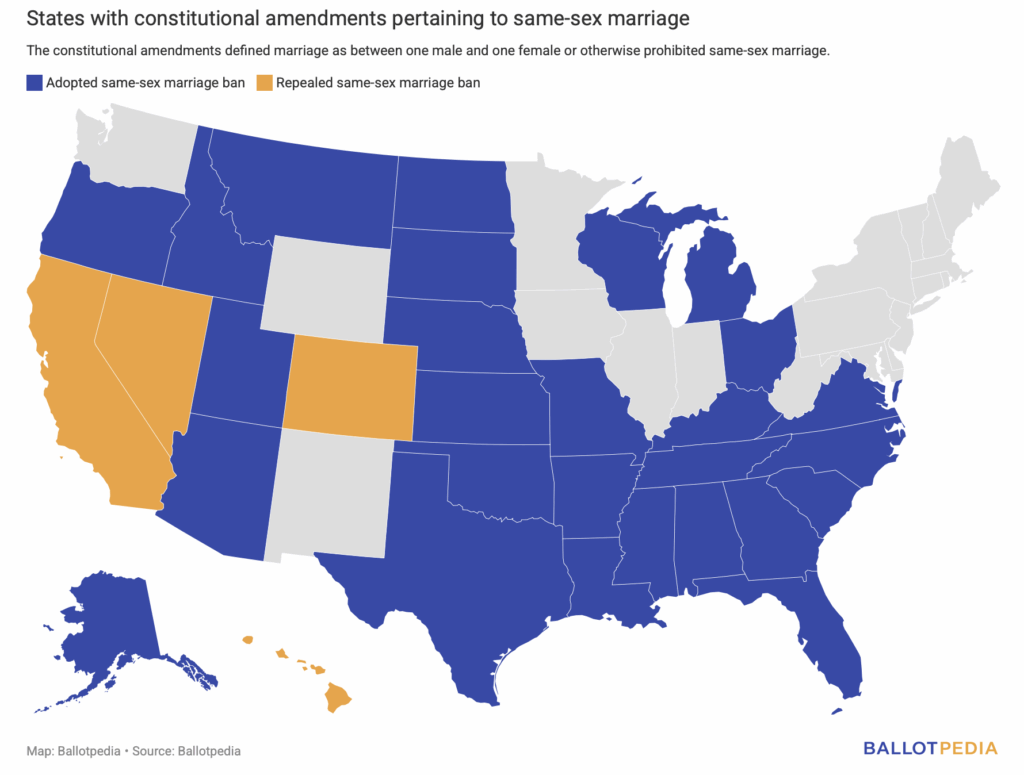Voters in eight states could decide on 12 ballot measures related to sex, gender, and LGBTQ issues in 2026.
Of these 12 measures, one has been certified for the ballot—Missouri Amendment 3. The other 11 are proposed, either citizen-initiated ballot measures that have been cleared for signature gathering or legislative referrals that require additional votes.
Some measures address more than one subtopic, which are as follows:
- Medical procedures for transgender minors in Colorado and Missouri
- Biological sex requirements for school sports teams in Colorado, Maine, and Washington
- Measures to prohibit discrimination or denial of rights based on gender identity or sexual orientation in Missouri, Ohio, Oregon, and Vermont
- Amendments to repeal existing constitutional bans on same-sex marriage in Missouri, Ohio, Oregon, and Virginia
Medical procedures for transgender minors
The one measure confirmed for the ballot is Missouri Amendment 3, which will appear on the general election ballot on Nov. 3, 2026. Amendment 3 would prohibit gender transition surgeries, as defined in law, for minors and prohibit the prescribing of hormone treatments or puberty-blocking drugs to minors, except for medical reasons "unrelated to the purpose of a gender transition." Amendment 3 would also prohibit abortion with certain exceptions and repeal the constitutional right to reproductive freedom, which voters approved in 2024. While constitutional amendments have addressed the legal status of abortion over the decades, Amendment 3 is the first to address medical procedures for transgender individuals, including minors.
In Colorado, a ballot initiative has been cleared for signature gathering that would prohibit healthcare professionals from performing, prescribing, administering, or providing surgeries "to a minor for the purpose of altering biological sex characteristics." The ballot initiative would also prohibit the use of state and federal funds to pay for these procedures. Signatures are due Feb. 20, 2026.
Biological sex requirements for school sports teams
Three ballot initiatives in Colorado, Maine, and Washington concern the use of biological sex as a requirement for participation in school sports teams.
- Colorado: The ballot initiative would require school-sponsored interscholastic and intramural sports teams to be designated as male, female, or coed based on students' biological sex. Teams designated for females would be closed to male students, while teams designated for males would be closed to female students unless no comparable female team is offered. Signatures are due on Feb. 20, 2026.
- Maine: Similar to Colorado, sports teams would be classified male, female, or coed based on the sex listed on a student’s original birth certificate. Teams designated for females would be closed to male students, while teams designated for males would be closed to female students unless no comparable female team is offered. Signatures are due on Feb. 2, 2026.
- Washington: The ballot initiative would prohibit biologically male students from participating in sports designated for female students. A student seeking to participate in a sport designated for female students would be required to provide a health examination and consent form from their personal healthcare provider verifying their biological sex, based on "reproductive anatomy, genetic makeup, or normal endogenously produced testosterone levels." Signatures are due on Jan. 2, 2026.
Measures to prohibit discrimination or denial of rights based on gender identity or sexual orientation
There are four potential ballot measures related to discrimination or the denial of rights based on gender identity or sexual orientation. Three of these measures are proposed constitutional amendments:
- Vermont: The state Legislature passed a constitutional amendment in 2024. The legislature must pass the amendment again during the 2026 legislative session. The proposal would add to the Vermont Bill of Rights: "The State shall not deny equal treatment under the law on account of a person’s race, ethnicity, sex, religion, disability, sexual orientation, gender identity, gender expression, or national origin."
- Ohio: The ballot initiative would provide that "Equality of rights under the law shall not be denied or abridged by the State of Ohio or its political subdivisions on account of race, color, creed or religion, sex, sexual orientation, gender identity or expression regardless of sex assigned at birth, pregnancy status, genetic information, disease status, age, disability, recovery status, familial status, ancestry, national origin, or military and veteran status." Signatures are due on July 1, 2026.
- Oregon: The ballot initiative would define the state’s prohibition on discrimination on account of sex to also cover discrimination based on pregnancy, pregnancy outcomes, health decisions, gender identity, sexual orientation, and marital status. The ballot initiative would also repeal the state's constitutional ban on same-sex marriage, which voters approved in 2004. Signatures are due on July 2, 2026.
In Missouri, an initiated state statute has been proposed to add sexual orientation, marital status, pregnancy, and gender identity to the list of categories protected from discrimination in housing, employment, and places of public accommodation. Signatures are due on May 3, 2026.
Amendments to repeal existing constitutional bans on same-sex marriage
Four proposed ballot measures concern existing same-sex marriage bans. In addition to Oregon, measures in Ohio, Missouri, and Virginia would remove existing constitutional provisions that define marriage as between a man and a woman. In 2015, the U.S. Supreme Court’s Obergefell v. Hodges decision made state constitutional amendments defining marriage as between a man and a woman unenforceable. Many of those provisions remain in state constitutions.
Between 1994 and 2012, 30 states decided on 34 measures to define marriage as between a man and a woman or prohibit same-sex marriage. Of these 34 measures, 31 were approved, and three were defeated. Later, between 2020 and 2024, four states—California, Colorado, Hawaii, and Nevada—voted to repeal previously approved measures banning same-sex marriage.

Additional reading:



